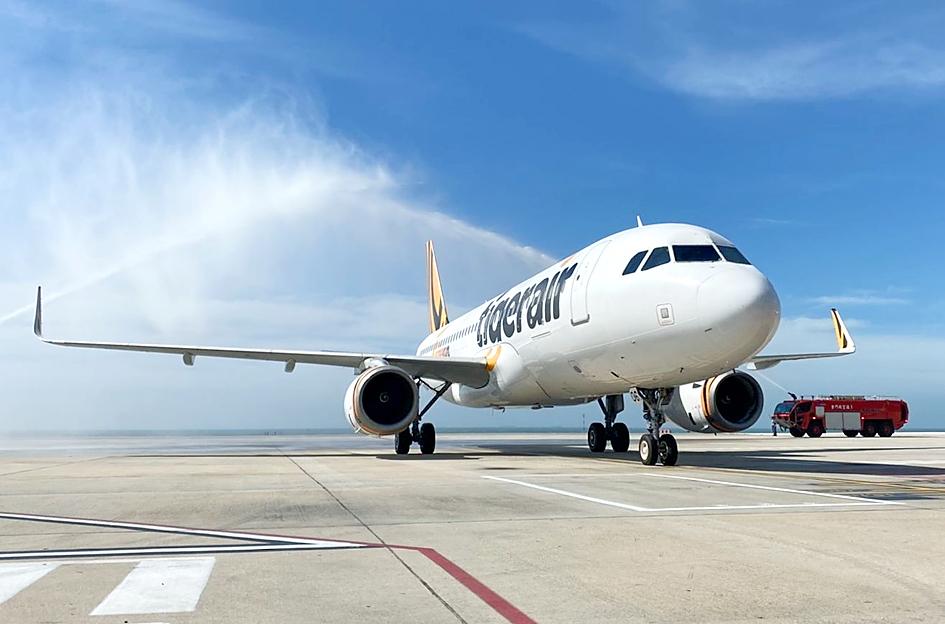Tigerair Taiwan Ltd (台灣虎航) is to issue 15 non-fungible tokens (NFTs) with each one set at a floor price of NT$150,000, the airline said in a statement yesterday.
In partnership with cryptocurrency exchange Maicoin Ltd (現代財富科技), the airline is to auction the 15 tokens from today to Thursday, allowing only Taiwanese to participate, the low-cost carrier said.
Consumers can purchase the tokens by credit card, it said.

Photo: Wu Cheng-ting, Taipei Times
The NFT issuance would be the first among Taiwanese airlines. The Ming Hwa Yuan Arts and Cultural Group (明華園戲劇總團) and Shiyun (師園) fried chicken shop issued NFTs in recent months.
Tigerair Taiwan is providing substantial perks to holders of its NFT tokens, such as allowing buyers to fly standby for free on any of its flights from July to the end of next year, it said.
“NFT buyers could get on a flight at the last minute if there is an unoccupied seat, although there is no guarantee of boarding when flying standby,” a Tigerair Taiwan official said in an interview with the Taipei Times.
Sometimes those who fly standby choose a different destination if they cannot get on their desired flight, but overall, it is an opportunity to save quite a bit of money, the official said.
Token buyers would also be eligible to take three complimentary trips on the airline’s new Airbus SE 320neo jets when the aircraft are delivered, the statement said.

TAKING STOCK: A Taiwanese cookware firm in Vietnam urged customers to assess inventory or place orders early so shipments can reach the US while tariffs are paused Taiwanese businesses in Vietnam are exploring alternatives after the White House imposed a 46 percent import duty on Vietnamese goods, following US President Donald Trump’s announcement of “reciprocal” tariffs on the US’ trading partners. Lo Shih-liang (羅世良), chairman of Brico Industry Co (裕茂工業), a Taiwanese company that manufactures cast iron cookware and stove components in Vietnam, said that more than 40 percent of his business was tied to the US market, describing the constant US policy shifts as an emotional roller coaster. “I work during the day and stay up all night watching the news. I’ve been following US news until 3am

UNCERTAINTY: Innolux activated a stringent supply chain management mechanism, as it did during the COVID-19 pandemic, to ensure optimal inventory levels for customers Flat-panel display makers AUO Corp (友達) and Innolux Corp (群創) yesterday said that about 12 to 20 percent of their display business is at risk of potential US tariffs and that they would relocate production or shipment destinations to mitigate the levies’ effects. US tariffs would have a direct impact of US$200 million on AUO’s revenue, company chairman Paul Peng (彭雙浪) told reporters on the sidelines of the Touch Taiwan trade show in Taipei yesterday. That would make up about 12 percent of the company’s overall revenue. To cope with the tariff uncertainty, AUO plans to allocate its production to manufacturing facilities in

COLLABORATION: Given Taiwan’s key position in global supply chains, the US firm is discussing strategies with local partners and clients to deal with global uncertainties Advanced Micro Devices Inc (AMD) yesterday said it is meeting with local ecosystem partners, including Taiwan Semiconductor Manufacturing Co (TSMC, 台積電), to discuss strategies, including long-term manufacturing, to navigate uncertainties such as US tariffs, as Taiwan occupies an important position in global supply chains. AMD chief executive officer Lisa Su (蘇姿丰) told reporters that Taiwan is an important part of the chip designer’s ecosystem and she is discussing with partners and customers in Taiwan to forge strong collaborations on different areas during this critical period. AMD has just become the first artificial-intelligence (AI) server chip customer of TSMC to utilize its advanced

Six years ago, LVMH’s billionaire CEO Bernard Arnault and US President Donald Trump cut the blue ribbon on a factory in rural Texas that would make designer handbags for Louis Vuitton, one of the world’s best-known luxury brands. However, since the high-profile opening, the factory has faced a host of problems limiting production, 11 former Louis Vuitton employees said. The site has consistently ranked among the worst-performing for Louis Vuitton globally, “significantly” underperforming other facilities, said three former Louis Vuitton workers and a senior industry source, who cited internal rankings shared with staff. The plant’s problems — which have not